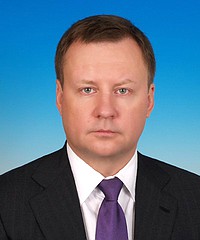Denis Voronenkov | |
|---|---|
Денис Вороненков | |
 | |
| Member of the State Duma | |
| In office 21 December 2011 – 5 October 2016 | |
| Personal details | |
| Born | Denis Nikolayevich Voronenkov 10 April 1971 Gorky, Russian SFSR, Soviet Union |
| Died | 23 March 2017 (aged 45) Kyiv, Ukraine |
| Manner of death | Assassination by gunshots |
| Political party | Unity (2000–2003) Independent (2003–2011; 2016–2017) Communist Party of the Russian Federation (2011–2016) |
| Spouse | Maria Maksakova Jr. (m. 2015) |
| Children | 3 |
| Awards | Medal "For Distinguished Service to the Drug Control Authorities", 3rd degree (2006)[1] |
| Military service | |
| Allegiance | |
| Branch/service | Soviet Army Russian Ground Forces |
| Years of service | 1988–1999 |
| Rank | Colonel |
Denis Nikolayevich Voronenkov (Russian: Денис Николаевич Вороненков, IPA: [dʲɪˈnʲis vərɐˈnʲɛnkəf]; 10 April 1971 – 23 March 2017) was a Russian politician who served as a member of the State Duma from 2011 to 2016. He was a member of the Unity party from 2000 to 2003 and the Communist Party of the Russian Federation from 2011 to 2016.
Voronenkov was born in Gorky, Russian SFSR. He studied at the Suvorov Military School before joining the Soviet Army. In 1999, he left the military to begin a career in politics. In 2001, he became an advisor to the Supreme Court of the Russian Federation, then being selected as the Deputy Mayor of Naryan-Mar and Deputy Governor of Nenets Autonomous District. Voronenkov then joined the Communist Party and was elected to the State Duma in 2011. In the 2016 legislative election he lost his seat to United Russia candidate Vladimir Panov.
The following month, Voronenkov renounced his Russian citizenship and emigrated to Ukraine with his wife, Maria Maksakova Jr. There he became a vocal critic of Russian president, Vladimir Putin, and Russian foreign policy. Although as a member of the State Duma, he had voted for Russia's annexation of Crimea, while in Ukraine he argued that the annexation had been illegal. In early 2017, the Investigative Committee of Russia opened a case to look into Voronenkov's suspected corruption, and an investigation by the anti-corruption blogger and Russian opposition figure Alexei Navalny found that Voronenkov possessed significantly more assets than his officially-declared income would allow.
Voronenkov was shot dead in Kyiv by a Ukrainian national, Pavlo Parshov. Ukrainian prosecutors believe that it had been a contract killing (arranged by an FSB officer) while the country's then-president, Petro Poroshenko, alleged that it had been orchestrated by the Russian government.